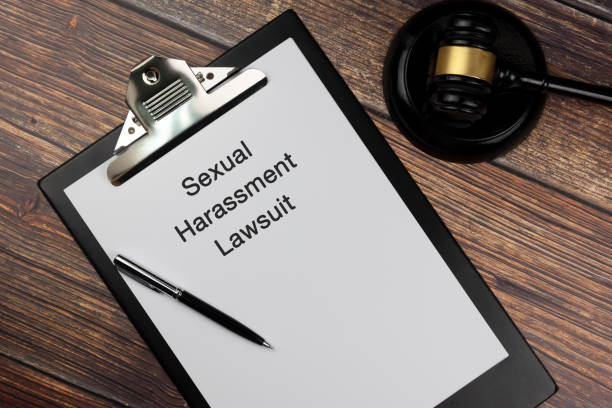
Sexual Harassment In Western Australia, What’s Going On?, Unlike all other Australian jurisdictions, and most countries around the world, Western Australia strangely does not permit complainants in Equal Opportunity matters – particularly sexual harassment and discrimination – to be represented by anybody who is not a lawyer. You cannot be represented by who you want. This is potentially a source of significant disadvantage, as the individuals who are most sexually harassed or discriminated against typically cannot afford in many cases exorbitant legal fees. Thus, rather than improving access to justice, the Western Australian Equality Opportunity Commission legislation is heedlessly making a low-cost jurisdiction much more expensive than it needs to be. There are many advocacy groups, including ourselves who specialize in this work that are banned under this legislation from representing disadvantaged people.
Section 92 of the Equal Opportunity Act 1984 (‘the Act’) governs representation in conciliation proceedings. It states that a complainant or respondent to a conciliation proceeding in the Equal Opportunity Commission can be represented by either a solicitor or counsel (s 92(1)(b)) or an agent other than a solicitor or counsel (s 92(1)(a)). Although ostensibly complainants can be represented by an agent, the catch in s 92(2) is that they must not be paid for their representation services – ‘No person other than a solicitor or counsel is entitled to demand or receive any fee or reward for representing a party in conciliation proceedings before the Commissioner.’
The rules shamefully subject vulnerable individuals to further disadvantages.
Essentially, by only permitting parties to be represented by either a solicitor, barrister, or someone who will work for free, the Act disenfranchises impecunious complainants. It is usually vulnerable employees who are targeted by sexual harassment or discrimination in the workplace. As stated Survey by Kate Jenkins, the Sex Discrimination Commissioner of the Australian Human Rights Commission, following the 2018 National Survey on Sexual Harassment in Australian Workplaces: “What is clear is that this conduct begins the moment people enter the workplace and that harassers prey on those less powerful than them.”[1]
The vulnerability may arise from personal attributes or working arrangements. For example, casual or part-time staff may be considered more dispensable than full-time staff and therefore the employer has less regard for their wellbeing. Younger employees could be exploited, with perpetrators believing that they may be less likely to speak up.
The 2018 National Survey found that young people aged between 18 to 29 were the most likely age group to be sexually harassed at work, 45% having experienced it in the past five years.[2] The 2018 National Survey also found that 16% of 15-17-year-olds had been sexually harassed at work.[3] Moreover, migrants, backpackers or refugees, particularly with poor English skills, could likewise be targeted because of the likelihood of them remaining silent. Single parents may also be perceived as targets because they will not speak up or leave due to relying on their job to support their children. Ultimately, it is individuals who lack significant financial means that are more susceptible to sexual harassment. This is affirmed by the 2018 National Survey which found that sexual harassment was most likely to occur in lower-income households earning between $15,000 – $34,999 per year (76%).[4]

Sexual Harassment In Western Australia
Moreover, it is not just the impecunious or vulnerable background of these potential claimants that causes disadvantage, but also the nature of their workplace. A vast number of complainants of sexual harassment or discrimination come from workplaces where stringent equal opportunity policies are not in place. Such workplaces may include small or family-owned businesses, cafes, restaurants, or childcare centers.
Conversely, employees from large corporations are not typically in the same position of precarity, as usually, their workplace will have strict equal opportunity policies and a dedicated human resources department. Large companies have learned to get their act together on managing sexual harassment and discrimination. It is typically the smaller, privately owned businesses that lack the effort, time, and resources to effectively manage equal opportunity issues.
Limiting representation in conciliation conferences to the lawyers club of either solicitors, barristers, or unpaid agents is at the detriment of those who cannot afford legal representation. Don’t get wrong there are many excellent sexual harassment lawyers practicing law in this area, its the limiting of the access to equable justice is the question. It is employees who do not earn a substantial income that is affected by these absurd rules. Employees earning less than $500 a week, or even less than $1000 a week, may struggle to afford any sort of legal representation. The costs of obtaining the services of a solicitor or barrister could amass to several weeks, if not months, worth of pay.
The only other alternative is to represent themselves in such circumstances. This is not equitable either, as they would be forced to front their employer, who is already in a position of power and authority and usually has also sought legal representation or advice. Matters of sexual harassment and discrimination are traumatic experiences and having to represent oneself against an employer that failed to protect them from unfair treatment can be a confronting and anxiety-inducing experience.
Complainants only have two options: Self-represent or fork out exorbitant legal fees.
The benefit of paid agents/advocates is that they can be a viable, more affordable option than solicitors or barristers. They can be the middle ground between self-representation and costly legal representation. Although Western Australia permits unpaid agents to represent parties to conciliation, it is unlikely a complainant would be able to find an expert agent to act on their behalf without being paid at all. Moreover, if a complainant is represented by an unpaid agent, they cannot appear alongside the complainant in the conciliation proceedings. Either the agent or the complainant themselves can speak and the other is required to stay outside the conciliation room. This is a significant disadvantage compared to having legal representation through a solicitor or barrister, who can remain in the room alongside their client.
Moreover, conciliation conferences are a voluntary process and do not involve a judicial determination. Conciliation is essentially a negotiation, and the parties are responsible for reaching an agreement. This means that there are no guarantees whether a conciliation will lead to an outcome for a complainant. If the complainant is required to obtain expensive legal representation for this conference, without certainty that the matter will be resolved, this can be a further financial burden to potential complainants, diminishing equality in accessing justice.
Choosing between financial hardship or psychological distress is an impossible choice.
For some, both the financial cost of legal representation and the psychological cost of self-representation is simply too high. This may lead some potential complainants to abandon their hopes of making a complaint and seeking redress. What does this mean for them? Most likely, they will have one of two options – they can continue working, potentially alongside their perpetrator; or they can resign. This is not a fair choice. Choosing between perpetuated unfair treatment or financial hardship is not a choice that should be made. The Equal Opportunity Commission is appallingly not catering to the members of the community who most need its help.
For instance, imagine a female migrant with poor English working as a casual employee in a small café. If she was to be sexually harassed, to whom could she turn? Legal representation is likely to be too expensive, and self-representation would be extremely difficult. Without the option of a paid agent that could be more affordable, she would be unfairly disenfranchised and may not make a complaint. She may also feel like she has no other choice but to keep working for her employer, alongside the person who sexually harassed her, merely because she needs a stable income. How is this fair and equitable?
The Equal Opportunity Commission is not ensuring equality for all. There are already low numbers of formal complaints. For example, the 2018 National Survey found that only 17% of people sexually harassed in the past five years actually went on to make a formal complaint or report.[5] It is already difficult enough for complainants to have the courage to pursue their complaint, and the Equal Opportunity Commission has only unnecessarily compounded this difficulty. Meant to be an accessible service, the Equal Opportunity Commission is only accessible to those who have the coin to afford it. It is outrageous that there is no affordable middle-ground for vulnerable Western Australians. If forced to self-represent due to financial constraints, how are complainants to ensure they get the best outcome possible? What if their employer can afford to be legally represented? There is nothing to bridge the disparity and it is quite possible that the complainant will be on the losing end of the bargain. The Equal Opportunity Commission is letting them down.
The rule against paid agents in the Act is nothing short of unreasonable. By way of comparison, conveyancers in Western Australia are not required to be lawyers, and yet representatives in conciliation matters in the Equal Opportunity Commission must be. Conveyancing services in Western Australia can be performed by either a settlement agent or a conveyancing lawyer. A settlement agent is a professional, but not legally trained. Unlike a lawyer, they cannot provide legal advice. However, settlement agents can still perform quasi-legal services – when paid agents cannot even represent a complainant in a conciliation conference. This inconsistency is thoughtless and perplexing. We are talking about conciliation, not even appearances in a court or tribunal. There is no logic to these ridiculous laws. Equity has been sacrificed for the sake of legal fees.
Western Australia should follow the example of all other Australian jurisdictions and permit paid agents to represent complainants in equal opportunity matters. It is ludicrous to leave complainants in such a precarious position that they are required to weigh up whether they would rather suffer financially or psychologically if they merely want justice for what happened to them. The Equal Opportunity Commission is recklessly creating barriers to achieving justice by potentially discouraging complainants from pursuing a case in what is meant to be a low-cost jurisdiction. Where is the equality that the Equal Opportunity Commission purports to uphold?
Sexual Harassment In Western Australia, What’s Going On?
We are advocates for peoples rights, i believe in the Aussie saying of “a fair go for everybody”, What’s wrong with that? Everybody is jumping on the bandwagon of you have rights, just in WA if you can afford them. A Whole New Approach Pty Ltd are not lawyers, we have been representing women in sexual harassment cases since 2004, not just since me too movement. I think it’s fair we state our interest in the circumstances. There are other options that can be considered for your sexual harassment case, depending on circumstances claims can be lodged in the Fair Work Commission as a general protection application, the Australian Human Rights Commission, or we can be your support person under the existing Western Australian regime. Talk to us on 1800 333 666, happy to give free advice.
[1] https://humanrights.gov.au/about/news/everyones-business-2018-sexual-harassment-survey
[2] Australian Human Rights Commission, Everyone’s Business: Fourth National Survey on Sexual Harassment in Australian Workplaces (Report, 2018). Available at <https://humanrights.gov.au/our-work/sex-discrimination/publications/everyones-business-fourth-national-survey-sexual> 8.
[3] Ibid 24.
[4] Ibid 23.
[5] Ibid 79.













